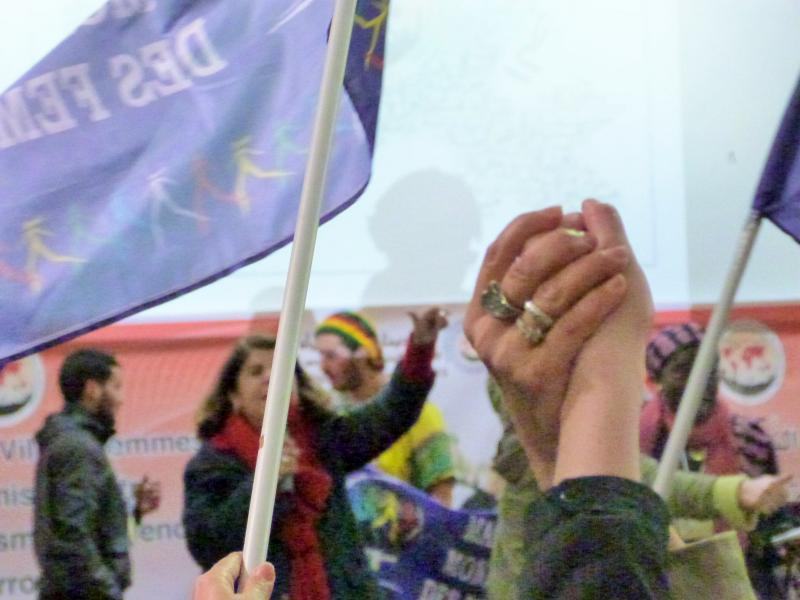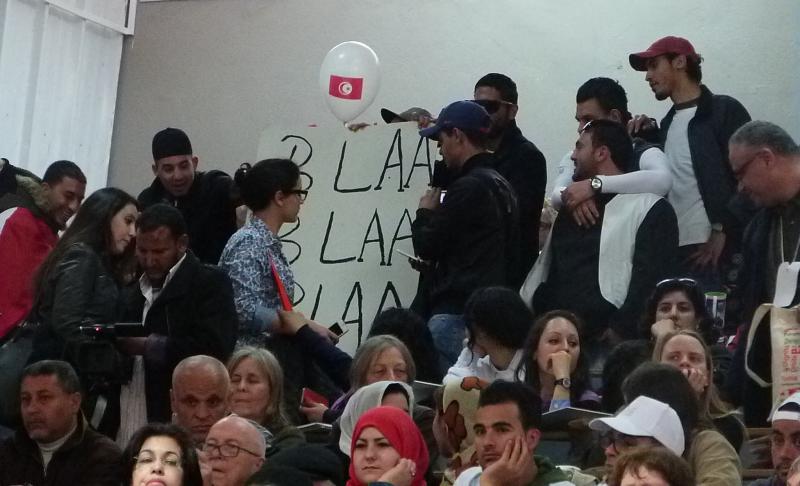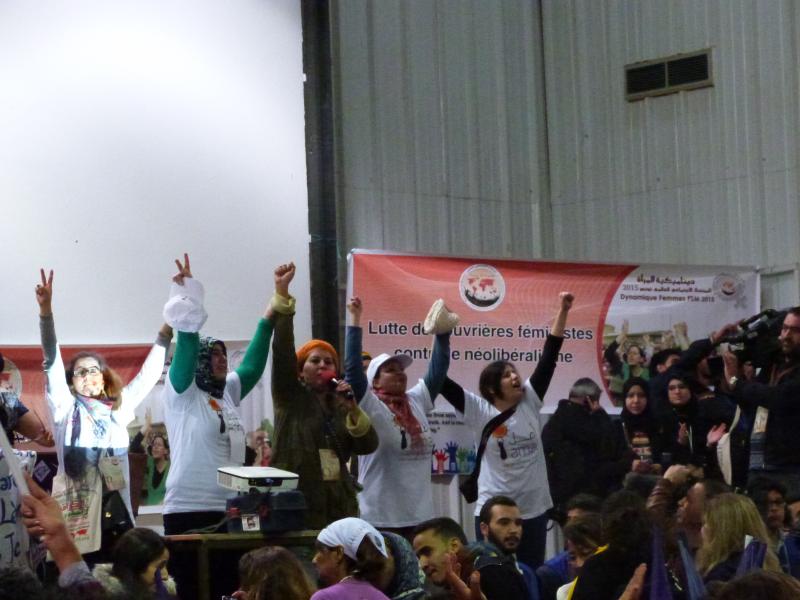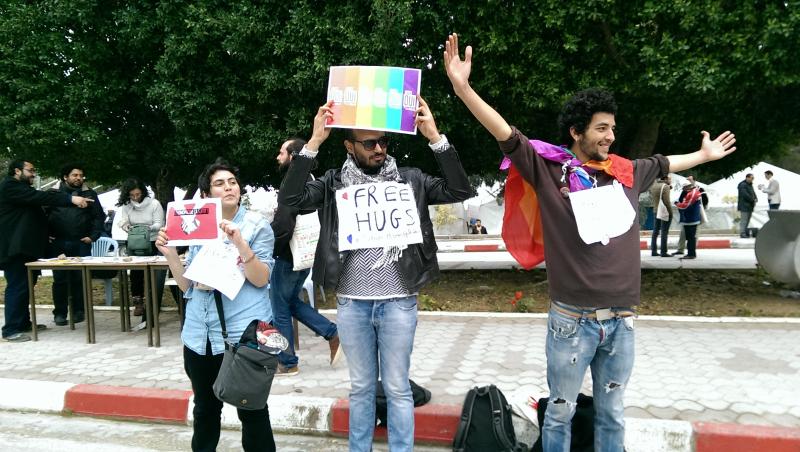FRIDAY FILE: Tens of thousands from around the world[1] gathered in Tunis, Tunisia from March 24th to 28th for the World Social Forum. It brought together social movements, civil society organizations, formal and informal networks and activists to oppose neo-liberalism, capitalism and imperialism, debating, exchanging, sharing experiences and developing proposals. This week AWID looks at some of the issues and challenges of building a feminist movement within the alter-globalization space.

The World Social Forum (WSF) is a space for a plurality and diversity of actors to articulate concrete actions with the objective of achieving “another world”. The space is neither denominational, nor governmental, nor partisan. Yet, given the context within which it exists, the WSF 2015 gave rise to a number of challenges in bringing together actors, with different visions, in a substantive way.
An underlying climate of violence
Following the Bardo national museum attack in Tunisia on the 18th of March 2015 that left 23 dead and 47 injured, the World Social Forum Preparatory Commission issued a communique that same day, indicating that the event would still take place:[2] “The WSF organizing committee calls upon all WSF members and participants to intensify their efforts in mobilizing and making this moment a success, allowing the victory of civic and pacific fight against terrorism and fanaticism that threaten democracy, freedom, and tolerance.” Following the attack, Tunisia’s Interior Minister, feared under the Ben Ali regime for his repression of human rights activists, was put in charge of WSF security. It is within this context that many participants, opposed to the language of the “war on terror,” had concern over the WSF as an instrument of national politics; and the security climate proved problematic for most participants. In response, a declaration initiated by the National Lawyers Guild was produced and signed by some twenty organizations, including AWID, warning of potential human rights abuses linked to the justification of the militarization of Tunisian society in a way that benefits the security/military-industrial-complex.

Despite a Charter of Principles saying that the WSF is a space that rejects the use of all violence diverse forms of violence against WSF participants were witnessed throughout the week. A group of people said to have been sent by Algerian authorities disrupted several workshops and resorted to violence against other participants, ranging from sabotaging stands to knife threats. The symbolic, physical and verbal violence was equally spread by other participants around issues like the independence of the Western Sahara, Bashar el-Assad’s Syrian regime, the Israel-Palestine conflict and the Women’s Assembly. Likewise, LGBTQI activists present and visible for the first time in a public demonstration in Tunisia faced insults and intimidation. Sexual harassment as well as the masculinization of certain spaces were also perceived by female participants at the El Manar Campus, the very place of the WSF.
Feminist movements in action
Despite challenges, feminists at the WSF were still able to shine light on their concerns around gender equality, and to create new alliances around social justice.

Opening the WSF, under the slogan “for equality, against violence,” the Women’s Assembly recalled the solidarity between women around the world. Regrettably, this assembly took place at the same as the Youth Assembly, revealing an absence of understanding around the inter-sectionality of gender within the WSF organization itself.
Following a minute of silence for the victims of imperialism, terrorism and all forms of violence; a diverse group of speakers from Tunisia, Morocco, Cote d’Ivoire, Mexico, Mozambique and France recalled the need to unite the struggles of all women across the world. One speaker from the World March of Women recalled that “women will continue on the march until all women are free.” “The convergence of our struggles is our exit strategy” said one Ivorian speaker. Despite an attempted provocation by a group of young men[3] and the challenge of allowing all women in the room a chance to speak,[4] the Assembly was an opportunity to recall the diverse aspects of violence, such as poverty, feminicide, racism and the establishment of imperial borders.
Self-organized events at the Forum presented an opportunity to highlight the diverse concerns of feminist movements, linked in particular to the inclusion of gender in the post-2015 agenda and the environment, building a sexual and reproductive rights movement – with regard to LGBTQI rights among others – in the Middle East and North Africa, the difficulties experienced by young feminist activists in the region, the impact of imperialism and religious fundamentalisms on women, the importance of a social protection system, economic justice, uniting feminist struggles against capitalism and patriarchy, and a feminism united in emancipating religion from patriarchy.

The importance of individual rights within an environment focused on collective rights was also highlighted during a workshop on lesbian women’s rights in Palestine. “At the personal level people realize to what extent sexual education is important, but would never say so publicly,” said one of the speakers from Muntada - The Arab Forum for Sexuality Education and Health. The co-director of Aswat - Palestinian Gay Women expressed the idea that, “we cannot address gender inequality in terms of sexual orientation without addressing the social system of oppression,” while recalling the problematic way in which the State of Israel exploits the issue of Palestinian LGBTQI communities to promote its own political agenda and to appear progressive. FRIDA, the Young Feminist Fund, also focused on LGBTQI rights in the Middle East and North Africa by organizing a meeting with young activists to address the difficulties they face, namely around security and the protection of activists, the lack of historical documentation on underground movements, the place of the LGBTQI movement within the feminist movement, the generational gap with other activists, homophobia and access to marginalized groups.
AWID, in partnership with other feminist organizations, organized a workshop on “Feminist Imaginations for a Just Economy” looking at how to dismantle economic systems of oppression beyond the simple regulation of capitalism. Speakers at the event identified the need to target diverse issues such as fiscal justice, food sovereignty and land rights. Some twenty participants also had the opportunity to discuss the need to create alternatives to existing models of consumption, privatization, taxation, property, governance and capitalist rule, all of which are at the root of oppression, while underlining the need to consider the inter-sectionality of struggles for economic justice as well as transforming existing social relations.
This convergence of struggles was also underscored during a workshop entitled “Feminists Unite and Take Action” in which the struggles of Tunisian, Palestinian, Kurdish, Mozambican and American women were exposed in order to form thematic working groups dealing respectively with the autonomy of women, appropriation of common goods and gender based violence as well as war and militarization. Finally, feminist issues were included within the larger economic and social emancipation movement, namely at a Convergence Assembly entitled “Dialogue on the Liberation and Emancipation between Religions, Cultures and Civilizations” within which the Collectif féministe pour l’égalité (Feminist Collective for Equality) recalled the need to create convergences on the basis of equality of rights, social justice, freedom of choice and peace within a framework of equality between men and women as well as equality between all women.
Within a context marked by numerous challenges, ranging from the use of violence to a lack of gender inclusion within the World Social Forum, on top of logistical challenges,[5] feminists were still able to bring light to their issues, building new alliances and showing their determination in the struggle for a just and equitable world.
[1] Most participants coming from the Middle East and North Africa region.
[2] Some participants, namely Westerners, nevertheless cancelled their trip, despite months of preparation.
[3] In an attempt to provoke, a group of about eight young men were armed with a sign marked “Blah-Blah-Blah.” Following altercations, the holder of the sign was removed from the Assembly.
[4] Sahrawi women did demand that their voice be heard on several accounts. After a number of demands and altercations, they rushed the stage to speak.
[5] Requests for translators were not always met, resulting in last minute room changes for workshops.
